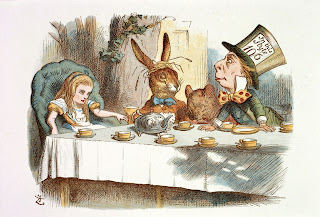Another discussion I need to cast my mind way back to.
In general as a group we discuss contemporary novels, but Ann suggested that it might be interesting to read a children's classic for a change, and we plumped for Alice in Wonderland.
I think all of us had seen the Disney film, and all except Mark had read the book as children. I had the Ward Lock copy my mother bought me when I was five, unillustrated apart from a colour frontispiece depicting the Mad Hatter's tea party, and defaced with my own five-year-old drawings and scrawlings. Ann had an old inherited copy with the famous Tenniel illustrations (one of which above), but she had also bought the Annotated Alice, so was able to talk about the background to the book and the circumstances of its writing. It was written in 1865 for the children of the Dean of Oxford by the Oxford mathematician and logician Charles Dodgson, aka Lewis Carroll, who originally illustrated the book himself.
The first thing we said was that we were surprised to find there were events in the book we hadn't remembered. Neither Ann nor I had at all remembered the Lobster Quadrille (in which all the sea creatures dance on the shore), and I think maybe Clare hadn't either. I hadn't remembered the puppy that appears from nowhere and which Alice chases into the wood, and I hadn't really remembered the incident when her neck grows so long her head emerges over the tops of the trees. We wondered if this were due to the influence of the film, but couldn't really say.
The book, we realised on this reading, is a stunningly prescient portrayal of the workings of the dreaming mind, pre-dating Freud. The surreal plot, famously, operates by dream logic (the whole thing is Alice's dream), with characters including Alice herself morphing or, like the Cheshire Cat, disappearing and reappearing. There is a riff on the subject of time, which is of course distorted in dreams - at the Mad Hatter's tea party it is always six o'clock, and his watch shows the day of the month but not the time. Characters operate madly inverted or false logic: according to the Pigeon, the fact that serpents eat eggs and that Alice has tasted eggs proves she's a serpent, and the Frog-Footman sitting on the outside of the door he is manning tells her there's no point in her knocking and being expected to be admitted, as he isn't inside to let her in. There is punning and play on word association, leading to confusion:
'Mine is a long a sad tale!'' said the Mouse, turning to Alice and sighing.
'It is a long tail, certainly,'' said Alice, looking down with wonder at the Mouse's tail.
The Mock Turtle tells Alice that when he was little they went to school in the sea and that they called their master, an old Turtle, Tortoise:
'Why did you call him Tortoise if he wasn't one?' Alice asked.
'We called him Tortoise because he taught us,'' said the Mock Turtle a little angrily; 'really you are very dull!'
There is a concrete poem with diminishing typography, taking the shape of a mouse's tail, and there are tongue-in-cheek parodies of Victorian nursery rhymes: "Twinkle, twinkle, little bat!/How I wonder what you're at!"
Throughout, Alice challenges the false logic of the characters, and the book amounts (among other things) to a take-down of the sentimentality with which Victorian children were regarded, and the irrational strictures placed on them. 'Why is a raven like a writing desk?'' asks the Mad Hatter, and Alice is supposed to answer when there isn't in fact any answer. "I think you might do something better with your time,'' Alice chides him, "than wasting it in riddles that have no answer." As Ann commented, Alice is a very feisty female protagonist, unusual in Victorian books for children.
Mark, who had never read the book but only seen the film, was very impressed by the book's verbal cleverness and liked it very much. John and Doug, however, were I'm afraid left cold by it, John saying that he knew it so well he could hardly judge it, but found it rather flat compared to the vividness of the film. (He read my unillustrated copy.). He wasn't as impressed as Mark by the verbal play, saying that it was only the same as that he would make with our own children - at which he was reminded that this is of course a book written, in similar circumstances, for three particular children. However, it has of course subsequently become part of the mental landscapes of generations of children worldwide, and has entered our language - we talk of 'going down a rabbit hole' and of people grinning like a Cheshire Cat - its name even taken for a neurological disorder*, so acute is it in its psychology.
*Alice in wonderland syndrome, a disorder of distorted perception and altered body image.
Our archive discussions can be found here and a list of the books we have discussed, with links to the discussions, here













No comments:
Post a Comment